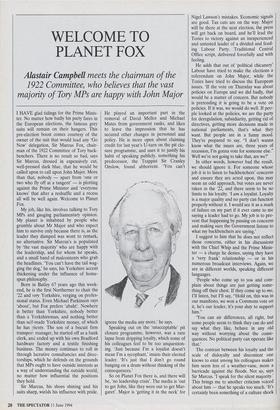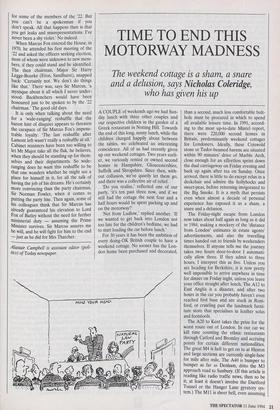WELCOME TO PLANET FOX
Alastair Campbell meets the chairman of the 1922 Committee, who believes that the vast majority of Tory MPs are happy with John Major I HAVE glad tidings for the Prime Minis- ter. No matter how badly his party fares in the European elections, the famous grey suits will remain on their hangers. This pre-election boost comes courtesy of the owner of the suit that would lead any 'Go Now' delegation, Sir Marcus Fox, chair- man of the 1922 Committee of Tory back- benchers. There is no result so bad, says Sir Marcus, dressed in expensively cut, well-pressed dark blue, that he would be called upon to call upon John Major. More than that, nobody — apart from 'one or two who fly off at a tangent' — is plotting against the Prime Minister and 'everyone knows' that after a reshuffle and a recess all will be well again. Welcome to Planet Fox.
My job, like his, involves talking to Tory MPs and gauging parliamentary opinion. My planet is inhabited by people who grumble about Mr Major and who expect him to survive only because there is, as the leader they dumped was wont to remark, no alternative. Sir Marcus's is populated by 'the vast majority' who are happy with the leadership, and for whom he speaks, and a small band of malcontents who grab the headlines. 'You can't have the tail wag- ging the dog,' he says, his Yorkshire accent thickening under the influence of home- spun philosophy.
Born in Batley 67 years ago this week- end, he is the first Northerner to chair the '22 and very Yorkshire, verging on profes- sional status. Even Michael Parkinson says `about', but Fox prefers 'abaht'. Nowhere is better than Yorkshire, nobody better than a Yorkshireman, and nothing better than self-made Yorkshire money, of which he has plenty. The son of a biscuit firm transport manager, he started off as a bank clerk, and ended up with his own Bradford hardware factory and a textile finishing business. The money continues to roll in through lucrative consultancies and direc- torships, which he defends on the grounds that MPs ought to have outside interests as a way of understanding the outside world, no matter how influential the positions they hold.
Sir Marcus, his shoes shining and his suits sharp, wields his influence with pride. He played an important part in the removal of David Mellor and Michael Mates from government ranks, and likes to leave the impression that he has secured other changes in personnel and policy. He is more open about claiming credit for last year's U-turn on the pit clo- sure programme, and uses it to justify his habit of speaking publicly, something his predecessor, the Trappist Sir Cranley Onslow, found abhorrent. 'You can't ignore the media any more,' he says.
Speaking out on the 'unacceptable' pit closure programme, however, was a rare lapse from dripping loyalty, which some of his colleagues feel to be too unquestion- ing. 'Just because I'm a loyalist doesn't mean I'm a sycophant,' insists their elected leader. 'It's just that I don't go round banging on a drum without thinking of the consequences.'
So on Planet Fox there is, and there will be, `no leadership crisis'. The media is 'out to get John, like they were out to get Mar- garet'. Major is 'getting it in the neck' for Nigel Lawson's mistakes. Economic signals are good. Tax cuts are on the way. Major will be there at the next election, the press will get back on board, and he'll lead the Tories to victory against an inexperienced and untested leader of a divided and feud- ing Labour Party. Traditional Central Office script, delivered forcefully and with feeling.
He adds that out of 'political chicanery' Labour have tried to make the elections a referendum on John Major, while the Tories have tried to discuss the European issues. 'If the vote on Thursday was about policies on Europe and we did badly, that would be a matter of concern. But nobody is pretending it is going to be a vote on policies. If it was, we would do well. If peo- ple looked at the policies, we are the party for deregulation, subsidiarity, getting rid of directives, getting more decisions made in national parliaments, that's what they want. But people are in a funny mood. They're prepared to say, "I don't wanna know what the issues are, three years of recession, I'm gonna vote for someone else." Well we're not going to take that, are we?'
In other words, however bad the result, we should ignore it. For someone whose job it is to listen to backbenchers' concerns and ensure they are acted upon, this may seem an odd approach, but votes are never taken in the '22, and there seem to be no limits to his loyalty. 'I am a loyalist. Loyalty is a major quality and no party can function properly without it. I would see it as a mark of failure on my part if it ever came to me saying a leader had to go. My job is to pre- vent that happening by passing on concerns and making sure the Government listens to what my backbenchers are saying.'
I suggest to him that he does not reflect those concerns, either in his discussions with the Chief Whip and the Prime Minis- ter — a charge he denies, saying they have a 'very frank' relationship — or in his numerous broadcast interviews. Again, we are in different worlds, speaking different languages.
`People who come up to you and com- plain about things are just getting some- thing off their chest. If they come up to me, I'll listen, but I'll say, "Hold on, this was in our manifesto, we won a Commons vote on it, he's our leader, it's your duty to support him."
`You can air differences, all right, but some people seem to think they can do and say what they like, behave in any old way without worrying about the conse- quences. No political party can operate like that.'
The contrast between his loyalty and the scale of disloyalty and discontent one knows to exist among his colleagues makes him seem less of a weather-vane, more a barricade against the floods. Not so, says Sir Marcus. 'I speak for the silent majority.' This brings me to another criticism voiced about him — that he speaks too much. It's certainly been something of a culture shock
for some of the members of the '22. But you can't be a spokesman if you don't speak. All that happens then is that you get leaks and misrepresentations. I've never been a shy violet.' No indeed. When Marcus Fox entered the House, in 1970, he attended his first meeting of the '22 and asked the officers seeking election, most of whom were unknown to new mem- bers, if they could stand and be identified. The then chairman, Major Sir Harry Legge-Bourke (Eton, Sandhurst), snapped back: 'Certainly not. We don't do things like that.' There was, says Sir Marcus, 'a mystique about it all which I never under- stood. Backbenchers would have been honoured just to be spoken to by the '22 chairman.' The good old days.
It is only when talking about the need for a 'wide-ranging' reshuffle that the barest hint of disquiet appears to threaten the carapace of Sir Marcus Fox's impene- trable loyalty. The last reshuffle after Lamont left wasn't really a reshuffle at all.' Cabinet ministers have been too willing to let Mr Major take all the flak, he believes, when they should be standing up for them- selves and their departments. So wide- ranging does he want this reshuffle to be that one wonders whether he might see a place for himself in it, for all the talk of having the job of his dreams. He's certainly more convincing than the party chairman, Sir Norman Fowler, when it comes to putting the party line. Then again, some of his colleagues think that Sir Marcus has already guaranteed his elevation to Lord Fox of Batley without the need for further ministerial duty — assuming the Prime Minister survives. Sir Marcus assures me he will, and he will fight for him to the end — just as he did for Mrs Thatcher.
Alastair Campbell is assistant editor (poli- tics) of Today newspaper.



































































 Previous page
Previous page